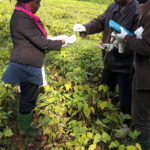


University of Greenwich
Nelson Mandela African Institution of Science and Technology, Tanzania Lilongwe University of Agriculture and Natural Resources, Malawi Royal Botanic Gardens, Kew, UK
Tanzania and Malawi
9/2017—9/2020
Insect pests are a major challenge to southern Africa’s food security due to the severe damage they often cause to crops. Pesticidal plants can make a significant contribution to controlling insect pests in legume crops, and results from previous CCRP funding has shown that they can be effective, safer, and more environmentally friendly than synthetic insecticides. However, specific recommendations on the use of pesticidal plants need to take account of a range of variables such as plant species, most suitable methods of extraction, and the frequency and methods of application. The recommendations may vary depending on type of legume crop, growing location, and the types of pesticidal plant species in that location. This project works with farmer research networks in Malawi and Tanzania to assess various parameters that optimize the way in which pesticidal plants can be used. An additional aim is to build capacity of research expertise, particularly developing a new generation of scientists with the broad range of skills necessary to identify and address knowledge gaps on the use of pesticidal plants. The issue of pest management is a priority in CCRP’s regional and program strategies. There is potential for using pesticidal plants to assist with the control of insect pests in a range of legume crops.
The proposed project builds on current and previous research and has the potential to enhance the uptake of pesticidal plant technologies through direct engagement with farmers. The project team has already accomplished research on the efficacy of a range of pesticidal plants against the pests of selected legumes (common bean and cowpea) that are hard to control through other means. The proposed research involves farmers more directly in evaluating the feasibility of the approach and would help to identify what works in different contexts.
The issue of pest management is a priority in CCRP’s regional and program strategies, and the approach used by the research partners is strongly oriented towards agroecological intensification. Insect pests are a frequently mentioned challenge in the Southern Africa Community of Practice. Thus, there is potential for using pesticidal plants to assist with the control of insect pests in a range of legume crops. The research partners have already started to collaborate with other project teams to explore this, and it will be intensified in the proposed project. The proposal has a strong capacity strengthening dimension and involves postgraduate students in the proposed research. The team has a strong track record in this area with a substantial number of MSc and PhD students graduating or currently studying at the Nelson Mandela Africa Institute of Science and Technology.
Understanding how pesticidal plants support agroecological intensification. An assessment of the cost-benefits to farmers using pesticidal plants compared to synthetics or no pest control. Feedback from farmers on constraints and opportunities for using pesticidal plants. Increased bean and cowpea yields. Increased household bean and cowpea consumption. Increased household income. Increased supply and marketing chains for pesticidal plant products. Decreased pre- and post-harvest loss of legume crops.

